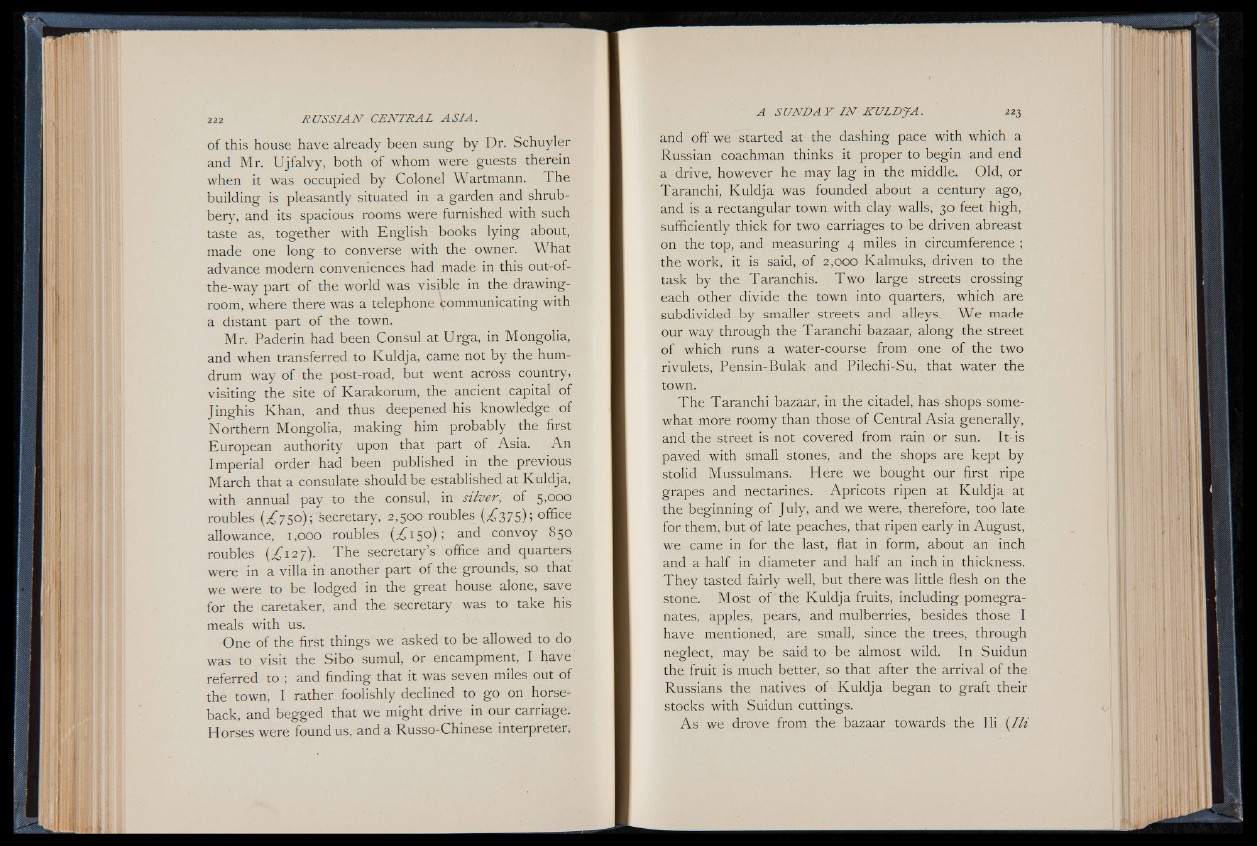
of this house have already been sung by Dr. Schuyler
and Mr. Ujfalvy, both of whom were guests therein
when it was occupied by Colonel Wartmann. The
building is pleasantly situated in a garden and shrubbery,
and its spacious rooms were furnished with such
taste as, together with English books lying about,
made one long to converse with the owner. What
advance modern conveniences had made in this out-of-
the-way part of the world was visible in the drawingroom,
where there was a telephone communicating with
a distant part of the town.
Mr. Paderin had been Consul at Urga, in Mongolia,
and when transferred to Kuldja, came not by the humdrum
way of the post-road, but went across country,
visiting the site of Karakorum, the ancient capital of
Jinghis Khan, and thus deepened his knowledge of
Northern Mongolia, making him probably the first
European authority upon that part of Asia. An
Imperial order had been published in the previous
March that a consulate should be established at Kuldja,
with annual pay to the consul, in silver, of 5,000
roubles (¿750 ); secretary, 2,500 roubles (¿3 7 5 ); office
allowance, 1,000 roubles (¿ 15 0 ) ; and convoy 850
roubles (¿ 12 7 ). The secretary’s office and quarters
were in a villa in another part of the grounds, so that
we were to be lodged in the great house alone, save
for the caretaker, and the secretary was to take his
meals with us.
One of the first things we asked to be allowed to do
was to visit the Sibo sumul, or encampment, I have
referred to ; and finding that it was seven miles out of
the town, I rather foolishly declined to go on horseback,
and begged that we might drive in our carriage.
Horses were found us,-and a Russo-Chinese interpreter,
and off we started at the dashing pace with which a
Russian coachman thinks it proper to begin and end
a drive, however he may lag in the middle. Old, or
Taranchi, Kuldja was founded about a century ago,
and is a rectangular town with clay walls, 30 feet high,
sufficiently thick for two carriages to be driven abreast
on the top, and measuring 4 miles in circumference ;
the work, it is said, of 2,000 Kalmuks, driven to the
task by the Taranchis. Two large streets crossing
each other divide the town into quarters, which are
subdivided by smaller streets and alleys. We made
our way through the Taranchi bazaar, along the street
of which runs a water-course from one of the two
rivulets, Pensin-Bulak and Pilechi-Su, that water the
town.
The Taranchi bazaar, in the citadel, has shops somewhat
more roomy than those of Central Asia generally,
and the street is not covered from rain or sun. It-is
paved with small stones, and the shops are kept by
stolid Mussulmans. Here we bought our first ripe
grapes and nectarines. Apricots ripen at Kuldja at
the beginning of July, and we were, therefore, too late
for them, but of late peaches, that ripen early in August,
we came in for the last, flat in form, about an inch
and a half in diameter and half an inch in thickness.
They tasted fairly well, but there was little flesh on the
stone. Most of the Kuldja fruits, including pomegranates,
apples, pears, and mulberries, besides those I
have mentioned, are small, since the trees, through
neglect, may be said to be almost wild. In Suidun
the fruit is much better, so that after the arrival of the
Russians the natives of Kuldja began to graft their
stocks with Suidun cuttings.
A s we drove from the bazaar towards the Ili {H i